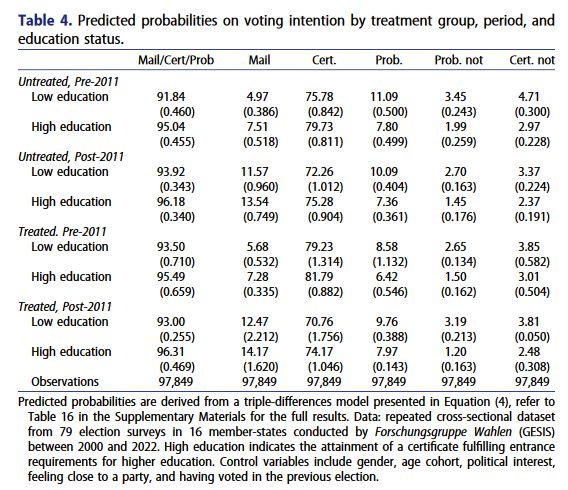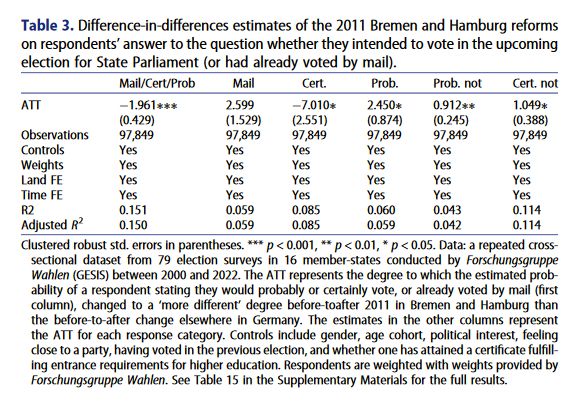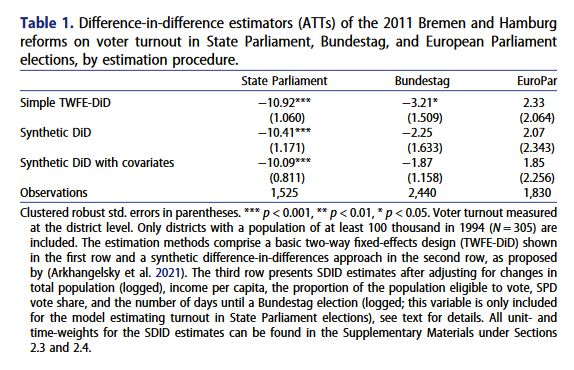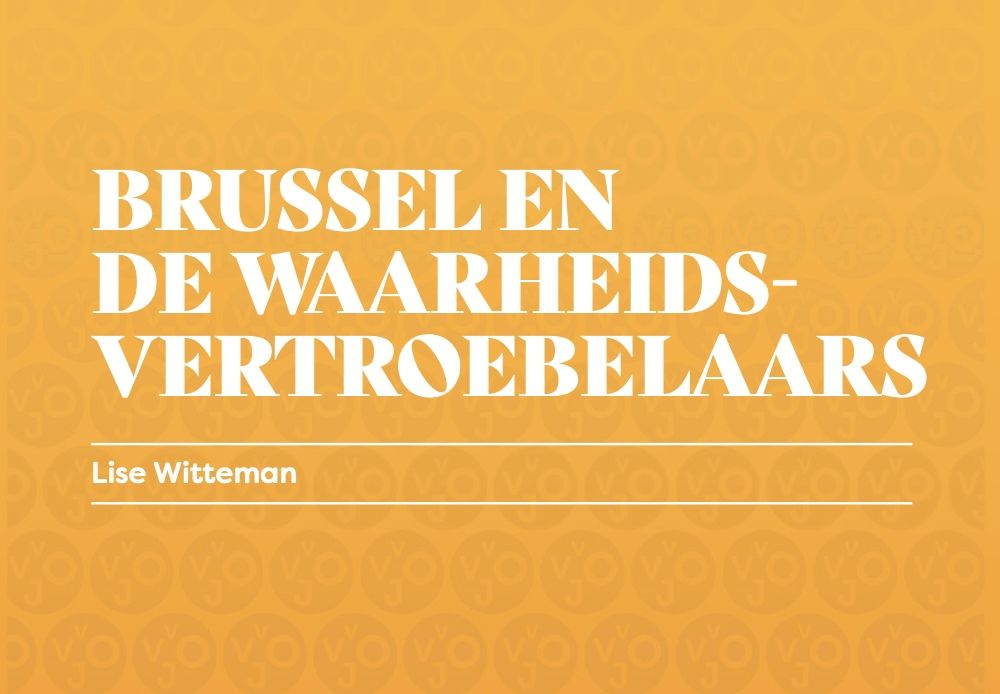Ik ben op zoek naar bevolkingsdata van de kiesdistricten van Amsterdam, Rotterdam, Utrecht, en Den Haag voor 1917. Heeft iemand toegang tot een digitale kopie Parlement en kiezer. Jaarboekje 1(1911-1912) tm 7(1917-1918) door Jungmann en Van Iterson? Eeuwige dank terug!
13.05.2025 14:00 — 👍 0 🔁 0 💬 0 📌 0
Congrats!
27.03.2025 16:04 — 👍 1 🔁 0 💬 1 📌 0
Many thanks for having me!
25.02.2025 17:31 — 👍 2 🔁 0 💬 0 📌 0

Victor Ellenbroek wins APSA
Victor Ellenbroek, researcher at the EUI Department of Political and Social Sciences, has been awarded the John Sullivan Award for a paper he presented at the
I am honored to receive the John Sullivan Award for the best paper by a graduate student on an Elections, Public Opinion, and Voting Behavior (EPOVB)-sponsored panel at APSA's 2023 Annual Meeting in Los Angeles.
Many thanks to all involved!
www.eui.eu/news-hub?id=...
05.06.2024 14:18 — 👍 1 🔁 0 💬 0 📌 0
Thanks Jack! My pleasure; I can share 50 free downloads. www.tandfonline.com/eprint/HZIAE... Feel free to reach out
15.03.2024 05:57 — 👍 0 🔁 0 💬 1 📌 0
#polsky
14.03.2024 13:54 — 👍 0 🔁 0 💬 0 📌 0

I also find that the reforms increased the participation gap between citizens with higher and lower levels of education. The lower-educated in Bremen and Hamburg were less likely to participate after 2011 compared to before, while lower educated elsewhere were more likely to turn out.
14.03.2024 13:50 — 👍 0 🔁 0 💬 0 📌 0

Moreover, I used data from 79 election surveys to compare 97,849 observations. I find a significant and negative disparity between the change in voting intention among respondents from Bremen and Hamburg before and after 2011 and the change observed among respondents from other member-states.
14.03.2024 13:44 — 👍 0 🔁 0 💬 0 📌 0

I find no significant before-to-after-reform differences in voter turnout for the unreformed Bundestag and European Parliament elections, ruling out that something other than the reforms is causing Bremen and Hamburg voters to be less inclined to vote.
14.03.2024 13:42 — 👍 1 🔁 0 💬 2 📌 0
The results hold after weighting control units and periods and after adjusting for population changes, changes in the share of citizens eligible to vote, changes in the SPD's vote share, and differences in the number of days until a federal election.
14.03.2024 13:40 — 👍 0 🔁 0 💬 1 📌 0
Pre-reform voter turnout trends in Bremen and Hamburg were similar to those in 305 comparable, untreated German districts or cities. However, the before-to-after-2011 change in Bremen and Hamburg is at least ten percentage points lower than elsewhere.
14.03.2024 13:40 — 👍 0 🔁 0 💬 1 📌 0
Despite extensive information campaigns, turnout reached historical lows below 60% after the system's implementation.
I find evidence for a causal relationship.
14.03.2024 13:40 — 👍 1 🔁 0 💬 1 📌 0
But do these changes induce voters to turn out? "Turns out," not in Germany: Bremen and Hamburg changed the system for their State Parliaments in 2011. Before, voters had one vote, to vote for a party. Now, voters have multiple votes to distribute and accumulate over all parties or candidates.
14.03.2024 13:39 — 👍 0 🔁 0 💬 1 📌 0
In recent decades, parties have changed how we vote: Increasingly, we vote for candidates, and these votes are also increasingly consequential in helping your favorite candidate pass the minimum number of votes required to win a seat.
14.03.2024 13:39 — 👍 1 🔁 0 💬 1 📌 0
I am happy to share that I have a new publication, "The Effect of More Choice on Voter Turnout: Causal Evidence from Germany," appearing today in German Politics: lnkd.in/e7dpNyFn
14.03.2024 13:38 — 👍 8 🔁 2 💬 3 📌 2
The European Political Science Society: the not-for-profit professional association for political science in Europe and beyond
https://epssnet.org/
Professor of Politics at Queen Mary University of London. Gender, diversity, parliaments, elections, institutions, French politics, UK politics. 🏳️🌈🌱
Gold Open Access journal from the European Consortium for Political Research (ECPR) https://www.tandfonline.com/toc/prxx20/current
Drone pilot, cabinetmaker, and fan of classic social theory.
Owner of @americanpurpose.bsky.social
European Political Science Review (EPSR) is an #OpenAccess journal of the European Consortium for Political Research (ECPR).
De Peilingwijzer combineert de Tweeede Kamerpeilingen van Ipsos I&O en @veriangroup.com/ @eenvandaag.nl. Door @tomlouwerse.nl van @UniLeiden.bsky.social
https://peilingwijzer.tomlouwerse.nl
A community of mere liberals. Discussing, defending, and applying the many varieties of liberalism. liberalcurrents.com
associate editor at liberal currents. neonliberal. she/her.
Program Coordinator at the German Marshall Fund of the United States.
Researcher, Romanian Centre for Russian Studies.
PhD, Doctoral School of Political Science, University of Bucharest.
Editorialist Agora.md.
Publishing original and substantial contributions to the study of comparative European politics. A journal from the European Consortium for Political Research (ECPR) https://ejpr.onlinelibrary.wiley.com/journal/14756765
PhD Researcher at the European University Institute. Migration, climate mobility, environmental justice, IOs, practice theory, qualitative methods.
Collectiespecialist @ Universiteit Leiden || Maker podcast 'Stop de Sloop': https://shorturl.at/4FDXJ || biograaf Jacq Vogelaar || redacteur pasuit.nl || Bezig met: kampliteratuur, kolonialisme, Holocaust, Goelag, arbeid, hoger onderwijs, pol.fil. fascisme
Associate Professor at the Univ. of Michigan
https://sites.lsa.umich.edu/lowande/
data, causal inference, experiments, politics
https://mattblackwell.org
Assistant Professor of Political Science, UW Madison.
Asst. Prof. of Statistics & Political Science at Penn State. I study stats methods, gerrymandering, & elections. Bayesian. Founder of UGSDW and proud alum of HGSU-UAW L. 5118.
corymccartan.com
Currently @ Yale, working on causal inference & cutting down on caffeine.
Website: melodyyhuang.com
PhD candidate (OID - @Wharton - @Penn). interests: causality, politics, ML duarteguilherme.github.io
Assistant Professor at NYU Politics
Assistant Professor of Political Science | University of Chicago




